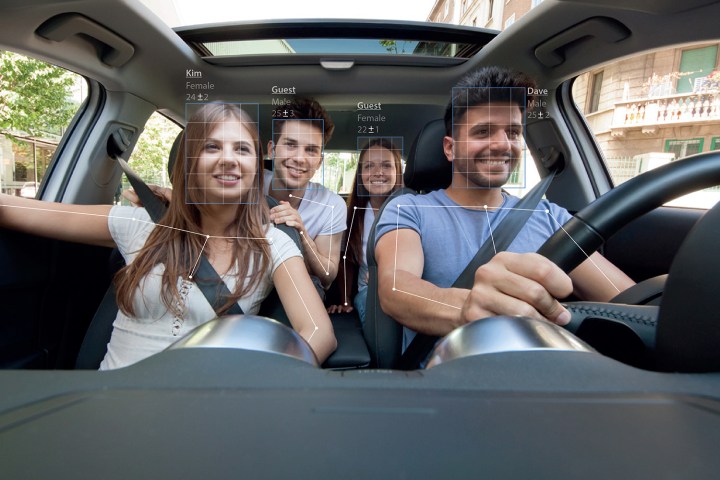
Whether it’s cabin temperature or the selection and volume of music, everyone has their own specific tastes when it comes to driving. What if your car could magically know not only who was in the driver’s seat, but also in every seat in the vehicle, and choose an option that’s likely to be satisfactory to everyone? That’s what Israel-based company Eyesight Technologies promises with its newly announced CabinSense in-car Occupancy Monitoring System.
Using A.I. technology, the system is capable of recognizing the number and placement of passengers in a car, as well as their age, gender, and the presence of any child seats through an onboard camera. It can either approximate this information — and presumably use it to make generalizations — or recognize the faces to specific users.
It’s not just about things like temperature or media choices, either. The system could also be used as a safety option. For example, it can detect whether passengers are wearing their seat belts properly. It could also disable certain airbags in cases where they might cause more harm than help — such as in the case of a child’s seat, or side airbags that could potentially harm elderly passengers.
“We use computer vision, essentially giving the car the ability to see the occupants just like we humans do,” Tal Krzypow, vice president of Product Management for Eyesight, told Digital Trends. “It’s like a mom reminding their kid to sit properly or wear their seatbelt correctly so that they’re protected. It’s like your partner pointing out the bag you almost forgot in the backseat. It’s like you realizing that, with the kids in the back seat, the temperature should be a tad higher, the volume a bit lower, and the playlist more cheerful.”
Ultimately, it will be up to car manufacturers as to how they deploy this technology. “CabinSense’s capabilities are only limited by the imagination, and the capacity of the car manufacturer,” Liat Rostock, who handles marketing for the technology, told us.
As of now, Eyesight Technologies is offering this as a solution to be built into new cars, as opposed to one that can be retrofitted by users like an aftermarket accessory. Krzypow said that this is because CabinSense is most beneficial when integrated with the car’s safety and infotainment systems, something that would presumably be more than a little tough for your average customer to figure out themselves.
Is this the dream of ultra-personalization come to life? Is it overly intrusive technology you’d rather steer clear of? Some combination of the above? The only thing we know for sure is that it’s on its way.


